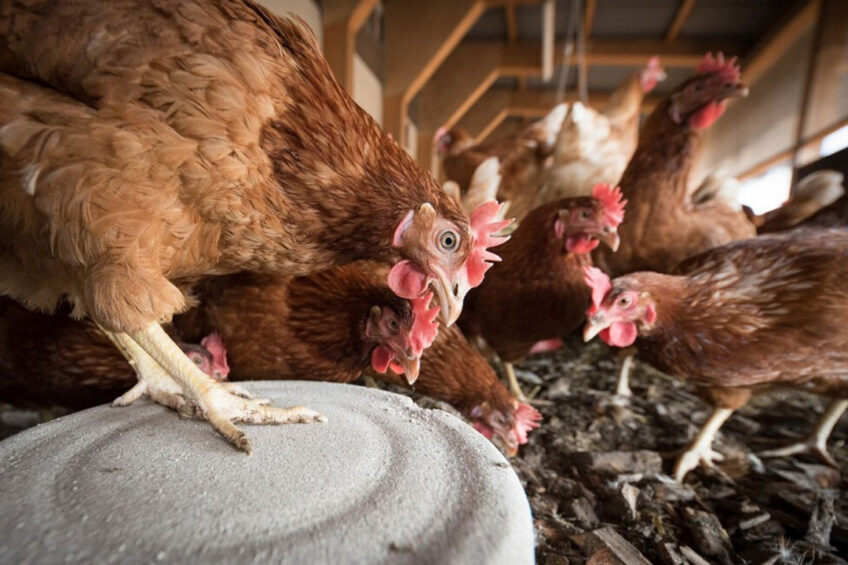Avian Influenza Prevention Zone declared for Great Britain

Bird keepers must implement strict biosecurity requirements after the UK government implemented an Avian Influenza Prevention Zone across the whole of Great Britain.
It comes on top of a recent announcement ordering poultry producers across a large area of East Anglia to keep birds indoors in the wake of many bird flu cases.
The Avian Influenza Prevention Zone means that all bird keepers must take extra precautions, such as restricting access for non-essential people on site, ensuring workers change clothing and footwear before entering bird enclosures and cleaning and disinfecting vehicles regularly to limit the risk of the disease spreading.
Over the last year, the UK has faced its largest ever outbreak of avian influenza with over 190 cases confirmed since late October 2021, with 30 of these confirmed since the beginning of this month. Defra has said the spread of the disease comes from infected wild birds spreading the virus into commercial flocks.
An increased risk
In a joint statement, the chief veterinary officers for England, Scotland and Wales said: “Bird keepers have faced the largest ever outbreak of avian flu this year and winter brings an even more increased risk to flocks as migratory birds return to the UK.
“Scrupulous biosecurity and hygiene measures are the best forms of defence, which is why we have declared an Avian Influenza Prevention Zones across Great Britain, meaning that all bird keepers must take action to help prevent the disease spreading to more poultry and domestic birds.”
A decision to introduce compulsory indoor housing for birds is constantly under review, said England’s chief veterinary officer, Christine Middlemiss, adding they may be introduced if numbers climb further.
Middlemiss said the government was looking to see if the H5N1 virus strain was more environmentally resilient than in the past.
“…completely exhausted already, mentally stressed, physically stressed”
Mark Gorton, owner of Traditional Norfolk Poultry, told BBC Farming Today that his birds were currently affected by a bird flu outbreak.
“We are feeling completely exhausted already, mentally stressed, physically stressed – a terrible situation to be in. We have had multiple cases across our farming estate involving tens of thousands of chickens and turkeys which have sadly had to be culled to prevent the disease spreading.
“It is absolutely devastating as there is nothing you can do. The first signs are the birds being a little off colour, but with this particular strain, it takes hold very quickly. You can go from not losing any birds in the morning to by the end of the day losing tens if not hundreds and then it just escalates from there over the next 2-3 days. It is an extremely devastating disease, and for the stockmen and farmers it is equally devastating as well.”
Vaccination
Gorton supports vaccination: “There are many reasons why avian influenza vaccination is not straightforward, but it is perfectly possible, and there are plenty of countries now using it. China, for example, has done so for the past 20 years and there are vaccine trials underway in several European countries including the UK.
Recently, the Pirbright Institute in Surrey announced the development of a ‘targeted antigen delivery vaccine’ that triggers high levels of antibodies against H9N2 flu virus. This novel vaccine not only provides long-lasting protection against flu but is not affected by maternal antibodies that can decrease the effectiveness of vaccines in chicks.
“This is an example of the type of huge advances made around vaccination for Covid that can be also applied to avian influenza vaccines. And just as Covid mutates from one strain to another, avian influenza strains change, too, and vaccines can be adapted to allow for this in the same way. It is not going to be straightforward or happen quickly – but I will keep banging my drum.”
The poultry sector as a whole is under immense pressure
National Farmers Union Poultry Board chairman, James Mottershead, said the sheer persistence of avian influenza over the past year, coupled with soaring energy and feed costs, had put the whole sector under huge emotional and financial pressure: “Given the recent rise in avian influenza cases and distress they cause for farming families, the implementation of housing measures in the east of England is a necessary step.
“The number one priority for poultry farmers has always been the health and welfare of their flock, and it’s devastating for any farmer to see that compromised. That is why the NFU is now urging Defra to consider expanding the regional housing measures on a national basis to reflect any increase in the levels of risk across the country.”
Join 31,000+ subscribers
Subscribe to our newsletter to stay updated about all the need-to-know content in the poultry sector, three times a week. Beheer
Beheer











 WP Admin
WP Admin  Bewerk bericht
Bewerk bericht